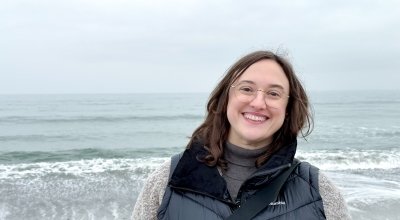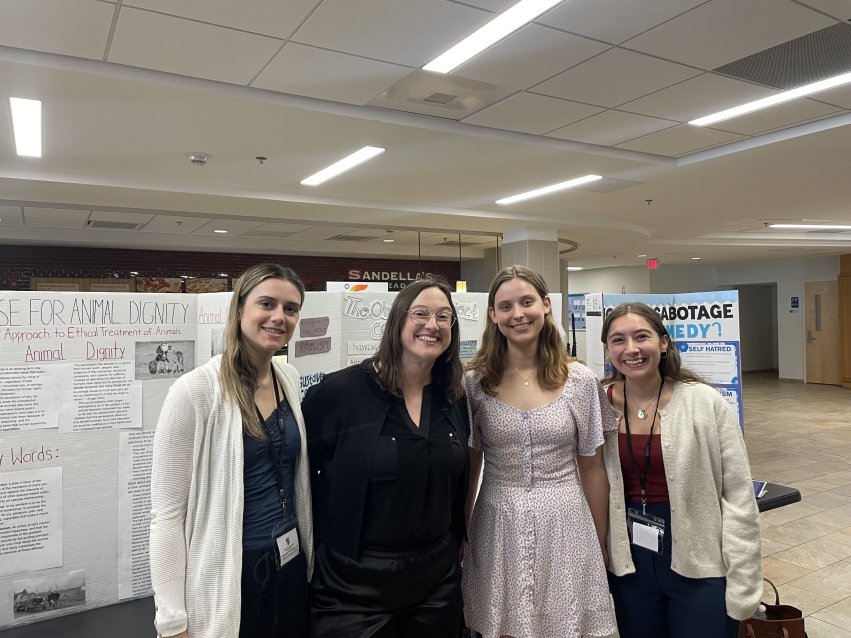
Dr. M. Katie Brennan brings research of 19th-century philosophers to the classroom

By Morgan Rizzo
Dr. M. Katie Brennan, assistant professor of philosophy, was always intrigued by the different ways one can approach questions about the fundamental aspects of human existence, knowledge, reality and morality. In high school, Brennan’s world religion class piqued her interest when she learned about the philosophical perspective of various religions.
“It ignited my curiosity to think about what other people thought and got my wheels turning about other approaches and paths to take,” said Brennan. During her undergraduate studies, Brennan was a double major in philosophy and English at St. Mary’s College of Maryland and fell in love with philosophy.
“Salve reminds me of St. Mary’s, where I had a wonderful philosophical education that I’m excited to share with the students at Salve,” shared Brennan. “I’m lucky to do this job because it’s something I fell in love with a long time ago.”
Brennan received her master's degree in liberal studies from St. John’s College, focusing on the foundations of philosophical literature, mathematics and sciences. She went on to earn a master’s degree in philosophy at SUNY Stony Brook and became an adjunct professor before completing her Ph.D. in philosophy at Temple University, where she taught for eight years.
When attending a conference at Brown University, she never imagined a job at Salve would be in her future. “I saw the beautiful campus - which is hard to overlook - and the mission of the school, which is very close to my heart and one that I can stand by and feel good about,” said Brennan. “I’ve been here for a year and a half, and have had a wonderful experience with lovely students and colleagues.”
Brennan specializes in 19th-century German philosophy, feminist philosophy and ethics, which complement the existing strengths of the Department of Philosophy faculty. One course that she teaches is PHL105: Finding Your Moral Compass, which features major ethical theories, including utilitarianism, Kantianism, virtue ethics and natural law theory. “I like to jazz it up a bit and interject it with topics to make it applicable to today,” said Brennan.
She strives to have an active learning mindset, incorporating debates, discussions and student-led presentations into her classes instead of lecturing. “Salve's mission wants you to be kind and merciful even if you disagree, so I teach how to have civil conversations in the classroom, understanding where others are coming from,” explained Brennan.

It’s helpful for students to place historical distance onto the topics so they can look at the past and learn how others have handled situations. “I always say I’m not here to tell you what to think, but teach you how to think and new perspectives you might not know of,” said Brennan. “It can be dry and difficult material to read, but it is rich with interesting questions that will tug on your ear and get in your head.”
Brennan intertwines her continued research on life affirmation through the perspective of 19th-century philosophers with her courses. “My dissertation research on German philosopher Friedrich Nietzsche looked at his philosophy of tragedy and the big question of why do we like, value and perhaps even enjoy tragedy when it depicts misery and suffering,” said Brennan. “There are different explanations for Nietzsche, and the answer is that tragedy actually helps you to affirm life, to find life worth living even when confronted with misfortune and suffering.”
In the social and political context, Brennan looks at history covering the work of 19th-century feminists she's been researching, including Hedwig Dohm. She brings this into her feminist philosophy course and the special topics course - PHL299: Rebellious Women in Philosophy - that Brennan will be teaching in the fall. “It’s fun because it intersects my current research on 19th-century women in German tradition who were writing, but were overlooked because at the time they did not have access to education,” said Brennan.
“My type of work is essentially the heart and soul of the University itself, looking at early women who wanted access to education,” explained Brennan. “Salve was founded as a place for women to get education when it wasn't available.”
Brennan cherishes the relationship not only between her research and Salve, but also the relationships she’s built with faculty and students. “Everyone’s been so lovely and kind,” said Brennan. “It’s small and feels like a community where you know people, and it's a good feeling.”
